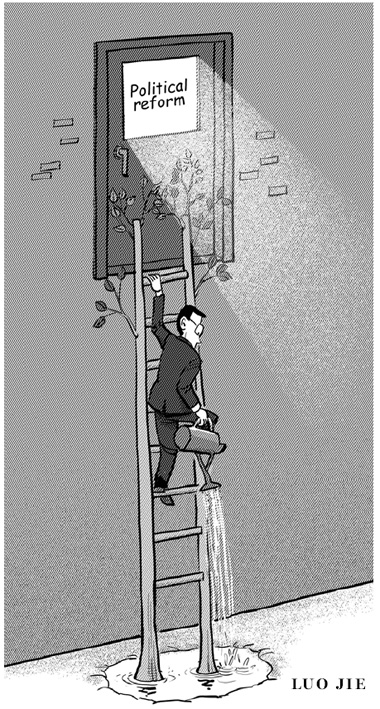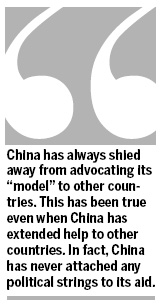Op-Ed Contributors
Political reform on track
By He Rulong (China Daily)
Updated: 2010-03-15 07:44
 |
Large Medium Small |
Proposal for equal rural-urban representation in National People's Congress proves foreign media's claim wrong
With its economy growing at 8.7 percent last year amid the global economic downturn and slated to become the second largest in the world this year, China has been constantly confronted with a question from the foreign media: How is its political system being structured?
Many foreign media outlets have lamented China's allegedly slow political reform compared with its economic miracle. But the Chinese government has always held a different view, saying that equal value has been placed on political reform. It has always stressed that political reform should be gradual and suit the country's circumstances as a whole.
| ||||

The revision draft, presented by NPC Standing Committee Vice-Chairman Wang Zhaoguo, says an NPC deputy from rural area would represent the same number of people as his or her urban counterpart. This is a major step forward because now NPC deputies from urban areas represent 240,000 people each, whereas those from the countryside represent 960,000. To the outside world, this change may have come too late, but China had to travel a protracted road to arrive at the proposed ratio.
China hasn't had equal urban-rural population representation for NPC deputies because of its national circumstances. When the first Electoral Law was enacted in 1953, China's urban population was only 13.26 percent of the total. Though a much larger part of its population was concentrated in the countryside, urban areas were political, economic and cultural centers where the working class lived. Equal population representation would have multiplied the number of rural deputies by many times, running counter to China's political system of rule by the people, led by the working class on the basis of the worker-peasant alliance.
This explains why the Electoral Law prescribed an 8:1 population representation ratio for rural and urban areas. By 1995, the country's urban population had grown to 29.04 percent of the total. As a result, the revision of the Electoral Law that year changed the rural-urban population ratio represented by an NPC deputy to 4:1.
China's industrialization and urbanization have accelerated further after 1995 and by last year, its urban population had increased to 46.6 percent. That prepared the foundation for equal population representation between NPC deputies from the rural and urban areas.
In 1953, Deng Xiaoping, then vice-premier, said: "To some extent, the differing representation is unequal. But only by so doing can we present a true picture of the country and reflect the leading role of the working class." Indeed, China's national conditions have played a big part in the differential representation.
But there is the issue of gradualness, too. After years of development, people's congresses at all levels have gone through many elections, gathered abundant experience, achieved enormous results in developing socialist democratic politics and a socialist legal system. This has expanded and consolidated the class base and mass foundation for the people's democratic rule. Thanks to these developments, the objective conditions are now ripe for electing NPC deputies on the same representational basis for urban and rural areas.
In 30-odd years of China's reform, the most emphasized words have been "national circumstances" and "gradualness". Consideration of its national circumstances and respect for gradualness can be seen in the direct elections at the grassroots, or at the village level.

Such a developmental philosophy has been evident on the economic front, too. At the beginning of reform and opening up, China vigorously pursued fast growth to strengthen its weak economic foundation. But when its economy reached a stage when sustainability assumed more importance, it stopped putting economic growth above everything else and started developing more comprehensively. It changed from seeking fast and sound economic growth to sound yet fast growth and from pursuit of speed in growth to changes in the economic growth pattern.
This is not merely a play on words, for such a change did not come overnight. Instead, it is based on careful consideration of China's national conditions and a lengthy experience summarization process.
China's economic miracle and the way it has overcome the global financial crisis have prompted the rest of world to wonder at the country's development "model". But China has always shied away from advocating its "model" to other countries. This has been true even when China has extended help to other countries. In fact, China has never attached any political strings to its aid.
Such a low profile conforms to China's governing philosophy. China believes that all countries should have enough room for self-exploration in order to find ways and systems that are best suited to their national conditions and to experiment with them gradually. China had had to experiment for more than half a century before arriving at equal rural-urban representation in the NPC. This may seem to be a slow process, but China has made the correct choice.
The author is a PhD scholar with the Institute of Human Rights and Humanitarian Law, China University of Political Science and Law.
(China Daily 03/15/2010 page8)













